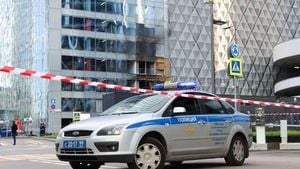The toll fees for the Blackwall Tunnel and the upcoming Silvertown Tunnel have been finalized by Transport for London (TfL), marking the first time drivers will pay to cross this historically free passage since the Blackwall Tunnel's inception back in 1897. Starting from Spring 2025, vehicles will incur charges aimed at reducing congestion and encouraging alternative transportation methods.
From 6 a.m. to 10 p.m. on weekdays, motorists will face peak rates of £4 for both car and small van drivers. Off-peak rates will drop to £1.50 for cars and both vans and motorcycles, provided drivers register with TfL’s Auto Pay system. Peak hours for the toll will apply from 6 to 10 a.m. and from 4 to 7 p.m. during weekdays. Without signing up for Auto Pay, drivers will be subject to the higher peak rate at all times when charging applies.
TfL’s Auto Pay system has already garnered over 1.3 million vehicle registrations, allowing for automatic toll charges to debit directly from users’ bank accounts. For heavy goods vehicles (HGVs) and larger vans, the toll will be significantly higher, set at £10 during peak times and £5 off-peak. Motorcyclists will see similar pricing as cars during off-peak hours, paying just £2.50 during peak hours.
Despite the anticipated backlash from motorists, who have voiced concerns about the new charges being akin to “cash grabs,” TfL insists the tolls are necessary to manage the high traffic levels already overwhelming the area. Authorities claim these revenues will go toward repaying the substantial debt accrued from the Silvertown Tunnel's PFI (private finance initiative) funding—totaling approximately £2.2 billion. This structure has raised alarm about increasing traffic congestion on major routes leading to both tunnels, promoting the need for tolls.
Mayor Sadiq Khan emphasized the potential benefits of the new tolling scheme, stating, "Londoners face chronic traffic congestion on the approaches to the Blackwall tunnel, which was never intended for the levels of traffic now crossing the river. The new Silvertown tunnel will ease congestion for drivers, reduce journeys times, and help manage air pollution." He also mentioned various discounts available for low-income drivers living within certain boroughs, who may qualify for rebates of up to 50% on the toll.
Adding more to the discount possibilities, small businesses registered within the designated areas can benefit from £1 off the standard off-peak charge for at least one year. Taxis, blue badge holders, and wheelchair-accessible private hire vehicles will be exempt from the charges altogether, catering to those with specific needs.
Environmental advocates have protested the toll system, expressing concerns it may not sufficiently deter car use and may continue to push individuals toward purchasing electric vehicles. Nevertheless, TfL is also setting up appropriate infrastructure to accommodate cyclists. Plans include creating bus lanes within the Silvertown Tunnel, as cycling will not be permitted through either tunnel due to safety regulations. Cyclists will have the option to use shuttle buses for free for the first year after the Silvertown Tunnel opens.
The toll rates for the Blackwall Tunnel and the new Silvertown Tunnel have been positioned within the broader conversation about road charges across London. For example, the Dartford crossing currently charges £2.50, the ULEZ limits for specific vehicles is £12.50, and the congestion charge is set at £15. Local drivers are concerned about who will shoulder these increasing costs and how they might impact communities surrounding the tunnels' entrances.
Experts predict the tolls will prompt some drivers to reconsider their routes, possibly opting for the more distant Dartford crossing instead, which could lead to shifts in traffic flow throughout the capital. While some anticipate improvements to the areas around the tunnels with lower congestion and possible air quality gains, others fear these tolls may disproportionately impact lower-income drivers and small businesses reliant on the transportation routes.
Over 100,000 vehicles currently use the Blackwall Tunnel daily, and authorities expect considerable traffic to shift to the Silvertown Tunnel when it finally opens to traffic. With construction delays extending the project timeline since its initial plans were proposed, drivers and residents alike are eager for clarity around the toll situation as the date draws closer.
Starting from the toll implementation, significant changes for travel routes and commuting times across London are anticipated. Despite the challenges, those affected by the toll system are being encouraged to explore new options as TfL aims to increase efficacy and safety on the roads leading to and from these crossings. Overall, this potential shift signifies TfL's response to adapting urban transportation needs.
Even with the protests and criticism surrounding the tolls, TfL and Mayor Khan remain resolute about meeting the challenges of congestion and environmental sustainability. "If we do not impose charges, there will likely be high levels of traffic and congestion, leading to detrimental air quality impacts and longer waiting times for drivers," claimed Christina Calderato, the Director of Strategy at TfL, as the authority prepares for what they hope will be a more efficient river-crossing experience for all Londoners.



